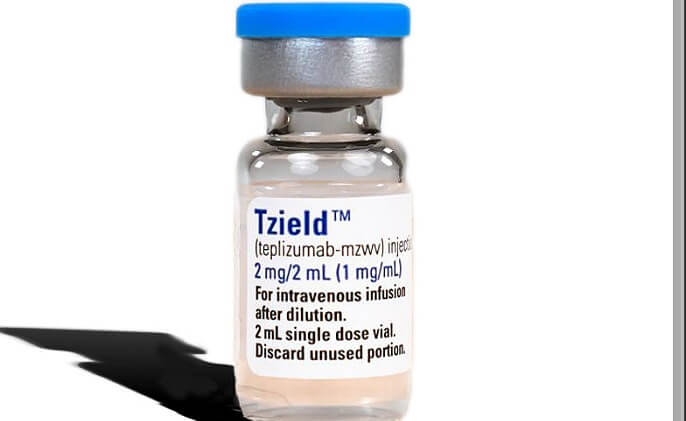Results Are Out: Tzield Benefits Newly Diagnosed Individuals

In the past year, we’ve seen a turning point for type 1 diabetes (T1D) treatments and technologies. In improving lives, we have new artificial pancreas systems and continuous glucose monitors (CGMs), which make living with T1D more manageable and convenient. In the area of cures for T1D, we have—in a historic moment for T1D—the first disease-modifying therapy, Tzield (teplizumab-mzwv), for use in delaying the onset of clinical disease in at-risk individuals.*
But what about the approximately 60,000+ people in the United States who are diagnosed each year with new-onset T1D?
Results from a new clinical trial suggest that Tzield has the potential to slow the progression of T1D for them.
Presented by Kevan Herold, M.D., and published in the New England Journal of Medicine, the PROTECT clinical trial investigated whether Tzield can slow the loss of beta cells and preserve beta cell function as measured by C-peptide in newly diagnosed (stage 3 T1D) children and adolescents ages 8-17. Per the study results just announced, it can.
In a press release issued by Sanofi (who acquired Provention Bio in April 2023), the data showed that:
- Tzield met the study’s primary endpoint, significantly slowing the decline of C-peptide levels, compared to placebo
- C-peptide is a biomarker for beta cell function
- Numerical trends favoring Tzield were seen in key secondary endpoints, whilst statistical significance was not achieved
- On average, people on Tzield required numerically fewer insulin units and had numerically higher time in range, compared to those on placebo
- Tzield has the potential to slow the progression of Stage 3 T1D in newly diagnosed individuals
“Tzield demonstrating effectiveness in a study of newly diagnosed children and adolescents is outstanding news,” said Sanjoy Dutta, Ph.D., JDRF chief scientific officer. “Preserving beta cell function in individuals diagnosed with type 1 diabetes is a critical step towards cures and, crucially, is helpful in type 1 diabetes management in these people. JDRF has believed in this therapy for decades and is continuing to study its potential uses in type 1 diabetes.”
“Thanks to Provention Bio and Sanofi’s ongoing commitment and dedication to individuals with type 1 diabetes, we now know that Tzield can benefit a new subset of the T1D population. JDRF applauds all efforts aimed at finding cures and improving therapies for individuals with type 1 diabetes.”
Tzield is not yet FDA approved for individuals with stage 3 T1D. In Sanofi’s press release they say that they look forward to discussing this new data with the scientific community and regulatory authorities around the world.
JDRF has supported the development of teplizumab for nearly 30 years, which includes contributions through research grants, federal funding via the Special Diabetes Program, a strategic investment by the JDRF T1D Fund that brought Provention Bio into T1D for the first time, and more.
JDRF is also currently pursuing multiple therapeutic approaches to cure T1D, and the T1D Fund has over 20 active cures programs in development.
*At-risk, or stage 2 T1D, means that a person exhibited 2+ T1D-related autoantibodies—antibodies against one’s own self—and their blood glucose is starting to be abnormal, but they are not yet insulin dependent. When someone becomes insulin dependent, they are in stage 3 T1D.